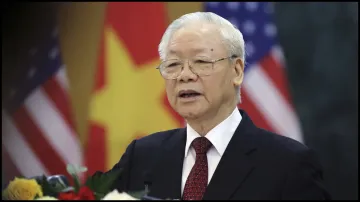Nguyen Phu Trong, powerful chief of Vietnam's Communist Party, dies at 80
Trong was the most powerful politician in Vietnam and had dominated the country's politics since 2011. He was responsible for a sweeping anti-corruption campaign known as the “blazing furnace” that singed both business and political elites.

Hanoi: Nguyen Phu Trong, general secretary of Vietnam's ruling Communist Party and the country's most powerful politician, has died at the age of 80 following months of ill health, according to the country's official media. Trong had dominated Vietnamese politics since 2011, when he was elected party chief.
During his tenure, he worked to consolidate the Communist Party's power in Vietnam's single-party political system. In the decade before he took the top role in Vietnamese politics, the balance of power had shifted more toward the governmental wing led by then-Prime Minister Nguyen Tan Dung.
“General Secretary of the Central Committee of the Party Nguyen Phu Trong passed away at 13:38 on July 19, 2024, at the 108 Central Military Hospital due to old age and serious illness,” read Vietnam's Nhan Dan newspaper. A state funeral will be held soon, as per media reports.
Who is Nguyen Phu Trong?
Born in 1944 in Hanoi, Trong was a Marxist-Leninist ideologue who earned a degree in philosophy before becoming a member of the Communist Party at the age of 22. He viewed corruption as the single gravest threat to maintaining the party’s legitimacy. “A country without discipline would be chaotic and unstable,” Trong said in 2016 after being reelected to the party’s helm.
The General Secretary of the ruling Communist Party is seen as the most powerful politician in Vietnam. Trong was responsible for a sweeping anti-corruption campaign known as the “blazing furnace” that singed both business and political elites. Since 2016, thousands of party officials have been disciplined, including former presidents Nguyen Xuan Phuc and Vo Van Thuong. In all, eight members of the powerful Politburo were ousted on corruption allegations, compared to none between 1986 and 2016.
Trong studied in the Soviet Union from 1981 to 1983, and there was speculation that under his leadership, Vietnam would move closer to Russia and China. However, the Southeast Asian nation followed a pragmatic policy of “bamboo diplomacy,” a phrase he coined that referred to the plant’s flexibility, bending but not breaking in the shifting headwinds of geopolitics.
Trong's legacy
Trong was educated in the Soviet Union and was regarded as a Marxist-Leninist ideologue. He secured a third term in 2021 after a rule limiting holders to two terms as party boss was waived, demonstrating his strength and significant political clout in a party that has ruled Vietnam for nearly half a century.
His death has left a political vacuum in the country and his legacy is mixed. Despite differences over sovereignty in the South China, Vietnam maintained its traditional ties with its much larger neighbour China, but also moved closer ties the United States by elevating its ties to a comprehensive strategic partnership.
His anti-graft campaign was seen as eroding institutions within the Communist Party and becoming more like China, where personal power has replaced institutions and rule. His protege President To Lam, who led the anti-corruption campaign, was appointed as the party's caretaker on July 18 when Trong received treatment for his ill-health.
Who will replace Trong?
The party’s Politburo asked Lam on Thursday to “preside over the work of the Party Central Committee, the Politburo, and the Secretariat", confirming Trong's poor health. Rumours about his health have swirled in Vietnamese politics since he was first hospitalized in 2019, and more recently when he appeared extremely frail while meeting visiting Russian President Vladimir Putin.
Lam is expected to replace Trong as party chief. The party will need to decide whether Lam will continue as acting party general secretary until the current term for the post expires after the next Congress in 2026, or whether it will elect a new candidate before then from within its ranks.
(with inputs from agencies)